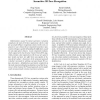Free Online Productivity Tools
i2Speak
i2Symbol
i2OCR
iTex2Img
iWeb2Print
iWeb2Shot
i2Type
iPdf2Split
iPdf2Merge
i2Bopomofo
i2Arabic
i2Style
i2Image
i2PDF
iLatex2Rtf
Sci2ools
127
Voted
FGR
2008
IEEE
2008
IEEE
Component-based registration with curvature descriptors for expression insensitive 3d face recognition
Deformations caused by facial expression variations complicate the task of 3D face registration which is vital for successful 3D face recognition systems. In this work, we propose to use a hierarchical component-based face registration technique capable of handling the difficulties caused by non-rigid nature of faces. Local components independently registered by the Iterative Closest Point (ICP) algorithm provides a fast registration with the use of a generic face model and does not suffer from non-rigidity of human facial surface. Invariance of the proposed approach is further increased by utilizing curvature-based 3D surface descriptors. Identification experiments conducted on the multi-expression Bosphorus database reveal that the accuracy of the classical ICP-based approach can be significantly increased under extreme expression variations.
| Added | 29 May 2010 |
| Updated | 29 May 2010 |
| Type | Conference |
| Year | 2008 |
| Where | FGR |
| Authors | Nese Alyüz, Berk Gökberk, Hamdi Dibeklioglu, Lale Akarun |
Comments (0)

